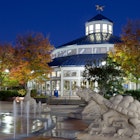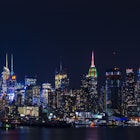
Experiencing the best jazz in Harlem, birthplace of bebop
Feb 25, 2019 • 4 min read

The Apollo Theater is an iconic jazz spot © Mikki Brammer / Lonely Planet
New Orleans might be the home of jazz, but New York City is where many of the genre’s greats became stars – and Harlem was at the heart of it.
The neighborhood experienced a rebirth during the Harlem Renaissance of the 1920s, led by a virtuosic community of black artists, musicians, writers and intellectuals who sought to explore and elevate black culture and heritage in the US. And its jazz joints were where much of the magic happened, fueled by the talents of soon-to-be icons like Louis Armstrong, Count Basie, Billie Holiday, Thelonious Monk and Charlie Parker. Even one of Harlem’s subway lines was immortalized in song – composer Billy Strayhorn was inspired to pen 'Take the A Train’ (the jazz standard made famous by Duke Ellington) after Ellington included the phrase when giving him directions to his home in Harlem.

But perhaps most famously, Harlem is known as the birthplace of bebop – the provocative, improvisational musical style characterized by intricate harmonies and rhythms. Thanks to its complex, often syncopated beats, bebop offered a more 'intellectual' alternative to traditional swing jazz – one that was intended to be appreciated through intense listening rather than dancing. These days you’ll find all styles of jazz in Harlem – here’s where to experience it at its best.
Bone up on history at the National Jazz Museum
Before you hit any of the clubs, stop in here first to brush up on the history of jazz in Harlem. The National Jazz Museum ($10 suggested donation for entry) is dedicated to the preservation, promotion and presentation of jazz not only through the exhibitions, but also through live performances and education. The real gem here is the Savory Collection – more than 100 hours of live recordings of jazz legends, created from radio broadcasts aired in New York City between 1935 and 1941. You can also try your hand at improvising alongside one of jazz’s current greats, bassist Christian McBride, via an interactive exhibit.

Dinner and music at Minton’s Playhouse
Saxophonist Henry Minton founded his namesake playhouse in 1938 as a place for local jazz musicians to gather for jam sessions. Located in what was once the Cecil Hotel, Minton’s Playhouse was where bebop got its start and became the freestyling playground of Thelonious Monk, Dizzy Gillespie, Charlie Parker and others. The jazz on show nowadays is still top notch – and you can dine while you listen (non-diners pay $15, plus a two-drink minimum).

Speakeasy style at Bill’s Place
Bill’s Place dates back to the Prohibition era, when the 133rd Street block was known as Swing Street, thanks to the string of speakeasies and jazz clubs that occupied the stretch. (And as the plaque by the door will tell you, Billie Holiday was 'discovered' here in 1933.) Tucked away in an old row house in true speakeasy style, Bill’s Place offers live jazz on Fridays and Saturdays at 8 and 10pm (doors open at 7:30pm and reservations are available) and entry is $30 cash at the door. Come here purely for the music and the ambiance: no alcohol is served on the premises.

Dive into pretense-free Paris Blues
It might feel like a bit of a dive bar, but that’s the point – no pretenses, just great jazz. This compact no-frills music joint presents free jazz shows seven nights a week (just plan on bringing some cash to tip the band). You’ll also likely see the dapper 81-year-old owner Samuel Hargress, Jr, who opened Paris Blues in 1968 and has managed it ever since, bopping his head along to the band.
Marjorie Eliot’s Parlor
You can’t get a more authentic manifestation of the spirit of jazz than an informal jazz concert hosted in someone’s living room. Every Sunday, jazz pianist Marjorie Eliot opens her apartment to a revolving roster of stellar musicians and music lovers who cram into the tight space for a free afternoon concert. Officially the music begins at 3:30pm, but try to get there at least an hour beforehand, as a line forms early. The apartment building, at 555 Edgecombe Avenue, is a national historic landmark, thanks to several of its famous past residents including Count Basie, Duke Ellington, Coleman Hawkins and Lena Horne.

Go backstage at The Apollo
One of New York City’s most famous music halls, The Apollo – known for its Amateur Night – provided the stage for some of jazz’s most iconic performers, including Ella Fitzgerald, Billie Holiday, Sarah Vaughan and Duke Ellington. These days The Apollo’s programming spans from music to comedy to dance, but it’s worth taking its Historic Tour, led by Billy 'Mr Apollo' Mitchell, for a peek behind the scenes. (Note that tours are available to groups of 20 or more, but individuals and smaller groups can join existing tours.)
Hitch a ride on the jazzmobile
Each summer, Jazzmobile presents free concerts in Harlem and other parts of the city in a bid to preserve the legacy of jazz and introduce the genre to the wider community and younger generations. Check its calendar or Facebook page for concert times and locations.
Soul food experience
While you’re in the neighborhood, chow down on some of the best soul food in New York City at Sylvia’s (try the peach cobbler), Amy Ruth’s (where dishes are named after famous African Americans), and, for something a little fancier, Marcus Samuelsson’s Red Rooster.
Explore related stories



 Wildlife & NatureDay trips from New Orleans: 9 can't-miss jaunts from The Big Easy
Wildlife & NatureDay trips from New Orleans: 9 can't-miss jaunts from The Big EasyNov 21, 2024 • 6 min read


 Wildlife & NatureHidden treasures: Where locals love to travel in Argentina
Wildlife & NatureHidden treasures: Where locals love to travel in ArgentinaNov 21, 2024 • 5 min read

 Destination Practicalities21 local tips to know before traveling to England
Destination Practicalities21 local tips to know before traveling to EnglandNov 21, 2024 • 9 min read

